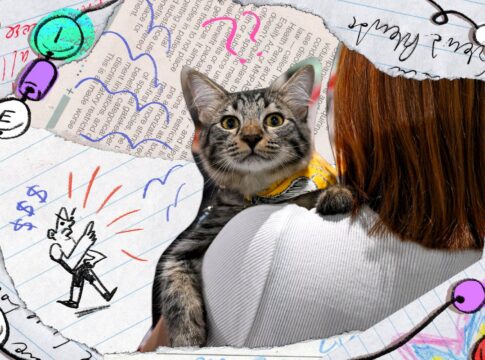This is part of Advice Week: Friendship Edition. We’ll help you make friends, leave them—and even sleep with them.
Four years ago, my fiancé and I drove his Honda Accord to central Illinois with my boxes of sweaters and his computer monitor blocking our rear view. We knew no one in the town we were headed to except each other; we were there because he was going to grad school, and I could work remotely. Our only welcome party was the whir of cicadas perched in the trees, which I’d never heard before, but they delighted me so much I’d roll down the windows to listen whenever I was in the car.
Up until this point in my life, I’d made friends and found community through clearly defined channels: my big family, middle school dance class, my college’s student-run magazine. I’d never experienced what it meant to be alone someplace without a dorm full of other people who were as eager as I was to fill the silence and form connections. It took me a few weeks in town to realize that wasn’t going to be the case anymore. I remember the moment it settled in: sitting in the parking lot after a late-night Target run, watching a gaggle of young women pile into their car together while they laughed and peeked into each other’s shopping bags. I routed the GPS to my new home. That was me once, and now it wasn’t.
For the next four years, the topic of friends—where to find them, how to make them, how to keep the ones that had scattered around the country—would obsess me. Both my fiancé and I had large friend groups back home in Miami. We did all the things you’re supposed to do in an attempt to replicate that. I joined a boxing gym, took up painting and pottery courses, met up for coffee and Thai food with people I chatted with on Bumble BFF. (I thought I had finally escaped the cruelty of dating apps—turns out they invented swiping left on potential friends, too.) I read the books about how to hang out and why we should make it a priority in our lives. I hosted parties and cooked holiday feasts. We’d even go out to dinner with other couples. On the drive home, we’d rehash the night like excited kids, building up our expectations for our new friends—let’s invite them to the drive-in! And then next, we’ll all go hiking! But no one ever seemed to match our enthusiasm, and the cast of characters at our gatherings never seemed to be the same twice.
Our third summer, I cleaned our barbecue in the yard, bought sparklers for the Fourth of July, and invited folks over—hardly anyone showed up, though. After the fireworks went off, and we were alone, I angrily ranted to my fiancé about all the disappointments we’d had to smile through since moving. I understand now that the bummer of a party wasn’t personal. Still, after three years of trying, I went on strike. No hangouts, no invites, no more. My partner was free to meet up with his friends—he’d managed to make some—for a Dungeons and Dragons game, and his lunches with colleagues. But I refused to be roped into meeting a new couple or hosting another Catan night. I wanted to protect what little pride I had left.
It sort of worked. Sometimes, I found that I was happy with filling my own time exactly as I wished, by throwing a mug on the pottery wheel, writing stories, and catching a plane to take me someplace far away. I felt liberated from having to pour so much into other people who didn’t seem to crave connection like I did. But other days, the fact that my social interactions were so limited crushed me. My partner, the barista, a work Zoom, and calls to my mom and sister simply weren’t enough. The loneliness and shame of not being successful in finding my people clouded everything for me. When we grew out of our 350-square-foot apartment and signed a lease on a townhouse, we popped champagne, and yet I pictured what it might look like full of familiar faces. Moments at our favorite places—floating down the lazy river, walking by the prairie—were tinged by my inability to share them with all the people we love. But I was also convinced that I shouldn’t let anyone except my fiancé know the full extent of how lonely I was. I couldn’t really talk about it with my friends in distant places because none of them were struggling with the same issue—and also because I had a looming fear that by talking about it, I’d sound like I’d failed.
I found, instead, solace in and a kinship with the people who wrote to our advice columnists for help in their lives. In August 2023, at the height of my strike, a 54-year-old man who signed his letter “Call Me, Maybe” wrote about constantly initiating plans with friends who never reciprocated: “It makes me feel like I am imposing on these people and generally friendless and worse of all, that if I didn’t make the effort to contact them, they would just go on with their lives and never think about me again.” We are likely such different people, yet I felt every word like I’d wrote it myself. “There’s nothing wrong with you!” Prudie wrote back. “Don’t feel bad about yourself!’” She shared notes from readers with advice, too, full of care, sympathy, and ideas I hadn’t considered (I await an update on “Skin McLovin’s” horseshoe club). During one particularly tough moment, as I stared down the prospect of another birthday spent in Illinois devising a Halloween costume I’d only wear in my living room—I’m a late-October baby—I wrote an anonymous letter myself, signing off as “Spooked.” I changed any identifying details as well as the nature of the problem, paranoid that someone might trace it back to me. I was deeply nervous and a little embarrassed when I noticed Prudie selected my entry, only to find comfort as I scrolled through the kind words Jenée Desmond-Harris, and readers in the comments, shared with me.
But even though I was trying to skirt around the subject with the people in my life, I was indulging in the fact that all everyone else seemed to want to talk about was friendship. We were discovering the ways the pandemic completely changed how many of our connections worked. Magazines were litigating friendship breakups. Last May, the surgeon general released an advisory about “the loneliness epidemic.” Even the government is now doling out advice for how some of us can fix our broken social lives.
I am still struggling with mine. But I do have one suggestion for how we can, collectively, fix this: Our only way out of our friendship heartbreak is being honest. We can and should be candid with our future friends about what we’re looking for, and with the ones we have about how arduous and long the process of creating community can actually be. We put so much energy into finding partners and jobs; why shouldn’t it be the same for friends? So I sought out people who can share with us advice and stories. During Slate’s Advice Week: Friendship Edition, you’ll hear from one writer about the ways she keeps long-distance friendships alive and from another about how he started over in a small town (an essay I wish I’d had in my hands all those years ago), and advice from our columnists about the issues with the friends in your lives. You’ll hear from a letter writer whose friend won’t stop hounding her about what she chose to drop five figures on. And if you’re lucky enough to have adventurous friends already, our sex advice columnists will have tips on how to get intimate with them. No matter what your friend troubles are, I hope you’ll find something this week that will help you through them—or, at least, will help you feel less alone.




